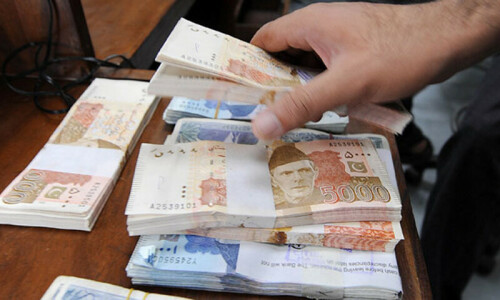Economic policy is a tricky business. There are intended and unintended consequences, factors that one can and cannot control. One such factor is an overreaching judiciary, which interferes in an economic transaction as it deems fit without understanding any principles of the same.
The Islamabad High Court recently gave a stay to banks that had to pay excess tax because they were not meeting the advance-deposit ratio (ADR), as mandated by the tax authority. Such an action effectively mutes the impact of any policy decision since the ability to execute remains dwarfed by an overreaching judiciary.
More than 70 per cent of the banking system’s assets are effectively allocated to either securities issued by the government or loans given to government or public sector entities. This leads to a crowding-out scenario, where the government crowds out access to loans to the private sector, thereby constraining economic growth in the process.
If a bank can allocate its available funds to relatively low-risk government lending, then why will it extend the same credit to the private sector? As credit to the private sector slows down, so does the overall economic growth because not much capital is flowing around to improve overall domestic investment in the country, resulting in constrained economic growth.
Ineffective policy tools and judicial intrusion meant to encourage private sector lending inadvertently diminish banks’ desire to lend to anyone other than the government
A tax was imposed on banks so that if they did not meet a certain threshold of the ADR, they would pay incremental tax. This was a policy tool to push banks to lend more to the private sector and move away from investing in securities issued by the sovereign.
This led to unintended consequences, such as banks starting to shed deposits and stopping to take deposits from customers. They also don’t want to lend to anyone other than the government, making key segments like small and medium enterprises and agriculture largely credit and capital-starved.
A banking sector which basically acts as a conduit for sovereign borrowing cannot contribute positively to economic growth. Fiscal tools that can nudge the same are being held back by the judiciary, muting the impact of policies in the process. If such precedence is set, then it is entirely possible that they may even intervene in monetary policy or other matters. The credibility of a policy arm is in its ability to execute; if the same ability is constrained by stay orders, the impact of any policy will remain muted.
Sustainable economic growth in Pakistan requires an increase in investment, and that can only be done if there are more savings in the system. It is sound economic policy to nudge financial institutions in a manner that they play an active role in the mobilisation of capital throughout various parts of an economy.
In the absence of capital, it will remain difficult for businesses to invest, create jobs, and expand the aggregate supply — pushing the country on imported goods to meet an increase in aggregate demand.
A breakdown of GDP during the last five years demonstrates that consumption makes up more than 92pc of GDP consistently, largely being fueled by imports — while investment as a percentage of GDP remained around 12pc. Our economic peers and the region maintain an investment-to-GDP ratio in the range of 30pc, which clearly demonstrates the significant lag that exists.
Such a ratio cannot be increased without the active participation of financial institutions, and the same cannot be done without effective policy tools. Pakistan needs its banks to start lending. In the absence of deep equity or debt capital markets, banks remain the primary source of capital for the economy.
The ADR for the entire banking sector stands at 37pc — which also includes lending to state-owned entities and other highly regulated segments, such as power, commodity financing and government-guaranteed loans. Such dismal capital accumulation levels are not sufficient to grow an economy at a rate that not only covers population growth but also increases income levels across the board.
An ADR of 75pc needs to be targeted by 2029 through a combination of fiscal policy tools (such as ADR tax, without any judicial overreach), and State Bank policy tools, such as any bank lending less than 50pc of its deposits, would need to place the short-fall interest-free with the State Bank, while the same floor can gradually be increased by 75pc by 2029.
At the same time, policymakers need to understand that weak collateral enforcement is a major reason for banks’ reluctance to lend to the private sector. Foreclosing on any kind of collateral should be made easy and free from the menace of the infamous “stay orders” which bad faith borrowers somehow find very easy to obtain.
Extension of the ADR tax, increasing the ADR gradually to 75pc till 2029, and a fiscally responsible government that does not run perpetual deficits remain key ingredients to attain sustainable growth. In the absence of this, we will continue to languish in the low-growth trap while banks will continue to act as sovereign borrowing conduits.
The writer is an assistant professor of practice at the School of Business Studies, IBA, Karachi
Published in Dawn, The Business and Finance Weekly, November 18th, 2024
















































Dear visitor, the comments section is undergoing an overhaul and will return soon.